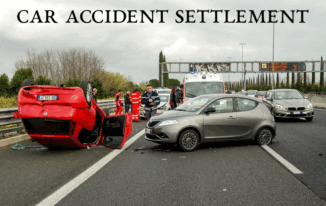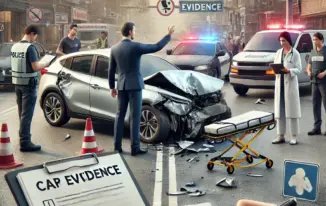Evidence plays a crucial role in car accident cases, shaping the outcome of personal injury claims and ensuring that injured parties receive fair compensation. Whether you’re a victim seeking justice or a defendant protecting your rights, having solid evidence is essential to build a strong case. This guide explores why evidence is so important in car accident cases and how it can influence the decision-making process in court.
Establishing Fault in Car Accident Claims
One of the primary purposes of evidence in car accident cases is to determine who is at fault. Without clear evidence, it can be difficult for victims to prove that another driver’s actions directly led to the accident. In some instances, the fault might be obvious, such as in a rear-end collision where the trailing driver is often presumed responsible. However, other cases may be more complicated, requiring more detailed investigation and proof.
Police reports, witness statements, and photographs from the accident scene all contribute to establishing who caused the accident. Eyewitnesses can offer valuable insights into the actions that led up to the incident, while photographs and videos can demonstrate road conditions, vehicle damage, and other factors that might have contributed. This evidence helps lawyers, insurance companies, and courts decide how the accident happened and who bears responsibility.
Supporting Injury Claims with Medical Evidence
Medical records are indispensable in car accident cases, especially for those who have suffered injuries. They serve as proof that the injuries were a direct result of the accident, making it possible for victims to seek compensation for their medical expenses and any long-term impacts on their health. Detailed documentation from doctors, physical therapists, and other healthcare professionals can strengthen a claim by showing the severity of the injuries, the treatment required, and the expected recovery time.
In many cases, victims also experience emotional or psychological trauma following an accident. Evidence from mental health professionals can support claims for these less visible injuries, ensuring that victims receive the full compensation they deserve. It is often difficult to prove non-physical injuries, which is why having a comprehensive medical record can be a critical piece of evidence in car accident cases.
Preserving Physical Evidence for Future Reference
Physical evidence from the accident scene can significantly impact a case. Skid marks, vehicle damage, and debris all tell a story of what happened in the moments leading up to and following the crash. For example, tire marks may indicate that a driver attempted to stop suddenly, suggesting possible speeding or distracted driving.
Accident reconstruction experts often analyze this kind of physical evidence to determine how the collision occurred. This analysis can help clarify ambiguities and provide a visual interpretation of the events. Having physical evidence preserved and documented as soon as possible after the accident strengthens the credibility of a claim and can offer crucial insights in cases where witness accounts are limited or unreliable.
Leveraging Expert Witnesses to Strengthen Claims
Expert witnesses bring specialized knowledge to car accident cases, lending additional weight to a claim. These professionals, such as accident reconstruction specialists or medical experts, can provide expert opinions that support the evidence. They analyze factors like impact speed, angles of collision, and mechanical failures that may have contributed to the accident, translating complex data into understandable insights for the court.
In cases involving serious injuries, medical experts can explain the potential long-term effects of injuries and their impact on a person’s life. For instance, if a car accident results in a severe back injury, a medical expert might testify to the victim’s inability to work in the future, thereby impacting compensation amounts. Expert witnesses not only validate the evidence presented but also provide a clear, detailed perspective that can help judges and juries understand the full context of the accident.
Securing Legal Support from Specialized Car Accident Lawyers
Hiring a lawyer with expertise in car accident cases is essential for navigating the complexities of legal procedures and ensuring evidence is properly collected and presented. Experienced attorneys know what kind of evidence will be most persuasive and how to use it effectively to build a strong case. They often have resources, such as connections with accident reconstruction experts or access to databases, that can aid in gathering critical evidence. For those involved in rear-end collisions, Rear-End Car Accident Lawyers at PoissonLaw.com recommend seeking specialized legal guidance that addresses the unique aspects of these cases, ensuring that critical evidence is effectively gathered and preserved. With the right legal support, victims are better equipped to secure compensation for their injuries and losses.
Role of Surveillance Footage and Digital Evidence
In today’s world, surveillance footage and digital evidence are often vital to proving fault in car accident cases. Many intersections and businesses have security cameras that may have captured the accident, providing a clear and unbiased view of the events. Additionally, dashcam footage from other vehicles can be invaluable in showing exactly how the accident unfolded.
Digital evidence also extends to cell phone records. For instance, if there is suspicion that a driver was texting at the time of the accident, obtaining their phone records could confirm distracted driving, a critical factor in many car accident claims. This type of evidence helps ensure accountability, reinforcing the necessity of digital records in establishing fault.
Understanding the Importance of Timely Evidence Collection
Timing is essential when collecting evidence in car accident cases. Some forms of evidence, such as skid marks on the road or witness memories, can fade over time. This is why it’s essential for victims to start gathering evidence as soon as possible after the accident. Filing a police report, taking photographs of the accident scene, and obtaining witness contact information all help preserve the initial details of the incident.
Timely evidence collection also applies to medical documentation. Seeking medical treatment immediately after the accident ensures that injuries are documented in their original state, which can prevent disputes about when and how they occurred. Acting quickly to gather evidence strengthens a case, making it easier to present a clear and compelling argument in court.
Reliable and thorough evidence is a foundation for any car accident case, making it possible to establish fault, support injury claims, and secure fair compensation. By gathering and presenting various forms of evidence—whether medical records, expert testimony, or digital footage—victims can strengthen their cases and increase their chances of a favorable outcome.



